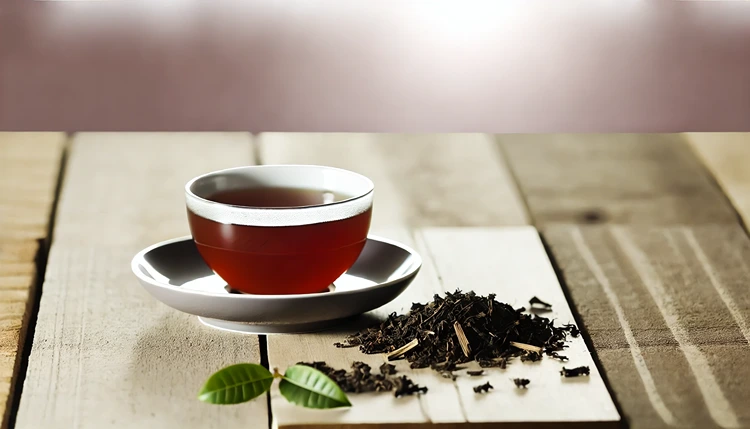Black tea isn’t just a comforting drink; it’s packed with benefits for your heart. When people search for ways to support heart health naturally, black tea often pops up on the list of top recommendations. But why?
It comes down to the unique blend of antioxidants in black tea, which can help reduce inflammation, improve blood vessel function, and even lower cholesterol. All of this adds up to serious heart benefits.
For those curious about how black tea impacts heart health, it’s worth knowing that studies have shown that regular consumption can help lower the risk of heart disease. Whether you drink it with breakfast or as a mid-afternoon pick-me-up, black tea can be a small yet impactful addition to your daily routine.
How Do Antioxidants in Black Tea Help the Heart?
Black tea is rich in powerful antioxidants known as flavonoids. These antioxidants play a key role in neutralizing free radicals that can damage cells and contribute to heart disease. By reducing oxidative stress, flavonoids help keep your heart’s arteries clear and functioning well.
Helpful Hint:
Drinking black tea alongside meals that are rich in antioxidants, like berries or leafy greens, can give you an extra heart-healthy boost. Try pairing it with a light, nutritious snack for better absorption of the antioxidants.
Can Black Tea Lower Blood Pressure?
High blood pressure is a serious concern for many people, especially as they age. One of the biggest questions about black tea is whether it can help manage blood pressure levels. The answer? Yes, it can.
Studies have found that black tea can lead to modest reductions in blood pressure, thanks to its ability to relax blood vessels and improve circulation. While it might not replace medication for those with severe hypertension, it’s a natural, tasty way to help keep blood pressure in check.
What Do Studies Say About Black Tea and Blood Pressure?
A study published in the journal *PLOS ONE* found that participants who drank black tea regularly experienced a slight but significant drop in both systolic and diastolic blood pressure. The study suggests that drinking black tea over a long period can provide cumulative benefits for managing blood pressure.
But here’s the catch: You need to stay consistent. While a single cup of black tea is great, it’s the regular consumption over weeks or months that leads to noticeable improvements in blood pressure.
How Much Black Tea Should You Drink for Heart Health?
Like many things in life, moderation is key. Drinking around 3 to 4 cups of black tea a day is considered optimal for heart health and blood pressure benefits. This amount gives you the right dose of flavonoids without going overboard on caffeine.
Of course, everyone’s tolerance for caffeine is different, so it’s important to listen to your body. If you’re sensitive to caffeine, consider balancing your black tea intake with caffeine-free options in the afternoon or evening.
Helpful Hint:
If you’re looking for a caffeine-free alternative to enjoy in the evenings, try a herbal tea like chamomile or rooibos. These teas won’t interfere with your sleep but can still contribute to your overall wellness routine.
Is Black Tea Better Than Green Tea for Heart Health?
Both black tea and green tea are known for their health benefits, but when it comes to heart health, is one better than the other? The answer depends on what you’re looking for.
Green tea has slightly higher levels of some antioxidants, particularly catechins, which are known for their potent anti-inflammatory properties. However, black tea contains theaflavins, another type of antioxidant that has been shown to support heart health in a different way.
If you’re a fan of both teas, alternating between black and green tea might be a good way to enjoy a range of heart-healthy benefits. Both are excellent choices, and the best tea for you might simply be the one you enjoy the most.
Which Tea Has More Antioxidants: Black or Green?
While green tea typically has more catechins, black tea’s unique antioxidants, theaflavins, have their own set of heart health benefits. These compounds are formed during the fermentation process that gives black tea its rich color and flavor. So, while the antioxidant profiles are different, both are powerful in their own right.
How Black Tea Reduces Cholesterol Levels
Cholesterol can be a tricky thing to manage, especially as we get older. One of the lesser-known benefits of black tea is its ability to help reduce cholesterol levels, particularly LDL, or “bad” cholesterol.
LDL cholesterol is a major contributor to heart disease, and lowering it is essential for maintaining a healthy heart. Drinking black tea regularly has been shown to reduce LDL levels, thanks to the antioxidants that help prevent the oxidation of cholesterol in the arteries.
What the Research Says About Cholesterol and Black Tea
Several studies have highlighted black tea’s role in cholesterol management. A review published in *The American Journal of Clinical Nutrition* found that regular black tea consumption led to a modest reduction in LDL cholesterol. While the changes were not huge, every little bit counts when it comes to heart health.
If you’re concerned about cholesterol, adding a cup or two of black tea to your daily routine is a simple and enjoyable way to support healthier levels.
Heart-Healthy Black Tea Recipe
Ingredients
- 2 black tea bags or 2 teaspoons of loose-leaf black tea
- 2 cups of water
- Optional: Lemon slices or a dash of cinnamon for flavor
Instructions
- Bring 2 cups of water to a boil.
- Add the black tea bags or loose-leaf tea and steep for 3-5 minutes.
- Remove tea bags or strain the tea. Add lemon or cinnamon if desired, and enjoy.
Unique Health Benefits of Black Tea
| Health Benefit | Explanation |
|---|---|
| Improved Artery Function | Black tea helps improve the flexibility and function of the arteries, reducing the risk of blockages and promoting better circulation. |
| Reduces Inflammation | The antioxidants in black tea help lower inflammation in the body, which is a major contributor to heart disease. |
| Enhanced Endothelial Health | Regular consumption of black tea can improve the health of the endothelium, the thin layer of cells that lines the arteries, promoting better overall heart function. |
| Better Blood Sugar Management | Black tea helps improve insulin sensitivity, reducing the risk of developing type 2 diabetes—a condition closely linked to heart disease. |
| Lower Stress Levels | Drinking black tea regularly can help reduce stress, which is a known factor in heart disease and high blood pressure. |
This black tea recipe is simple and can be tailored to your taste. The addition of lemon provides a vitamin C boost, while cinnamon adds extra anti-inflammatory properties to support heart health.
Are There Any Side Effects of Drinking Black Tea for Heart Health?
While black tea is generally safe for most people, there are a few potential side effects to keep in mind, especially if you consume a lot of it. The most common issue is caffeine. Drinking too much black tea can lead to caffeine-related side effects like jitteriness, insomnia, or digestive issues.
To avoid these problems, aim to drink 3 to 4 cups of black tea per day. If you’re sensitive to caffeine, try cutting back in the late afternoon or opting for decaf versions.
Another potential concern is iron absorption. Drinking tea, especially with meals, can slightly reduce the absorption of iron from plant-based foods. To counteract this, try drinking your tea between meals rather than with them.
Helpful Hint:
If you’re worried about iron absorption, try drinking black tea an hour or two after meals. This allows your body to absorb the iron from your food before the tea’s tannins interfere.
Can Black Tea Prevent Heart Attacks?
One of the most pressing questions for those concerned about heart health is whether black tea can help prevent heart attacks. While black tea isn’t a magic bullet, it does have properties that may reduce the risk of heart attacks when consumed regularly.
The antioxidants in black tea, particularly flavonoids, help improve blood circulation and keep arteries healthy. By preventing the buildup of plaque in the arteries, black tea reduces the risk of atherosclerosis, a condition that can lead to heart attacks.
How Does Black Tea Improve Blood Circulation?
Improving blood flow is critical for heart health, and black tea can help with that. The flavonoids in black tea promote better circulation by relaxing blood vessels, making it easier for blood to flow through the arteries. This improved circulation reduces the likelihood of blockages that can lead to heart attacks.
Furthermore, black tea helps reduce inflammation, which can contribute to arterial damage. By keeping inflammation in check, black tea helps maintain a healthier cardiovascular system overall.
How Black Tea Affects Blood Sugar and Heart Health
While black tea is often praised for its heart-healthy properties, it also has benefits for managing blood sugar levels. Since high blood sugar is a significant risk factor for heart disease, keeping it in check is essential for overall heart health.
Black tea contains compounds that may help regulate blood sugar levels. Drinking black tea regularly can improve how your body responds to insulin, lowering the risk of developing type 2 diabetes—a condition closely linked to heart disease.
Does Black Tea Reduce the Risk of Diabetes?
Several studies suggest that regular consumption of black tea can help lower the risk of developing type 2 diabetes. One such study published in *The Asia Pacific Journal of Clinical Nutrition* found that people who drank black tea daily had better blood sugar control than those who didn’t.
For those already managing diabetes, black tea can be a helpful addition to the diet. It may improve insulin sensitivity and help keep blood sugar levels stable throughout the day, reducing the strain on the heart.
How Much Caffeine Is in Black Tea?
Caffeine is one of the main reasons people reach for a cup of black tea, but how much caffeine does it actually contain? On average, an 8-ounce cup of black tea has about 40-60 milligrams of caffeine. This is less than coffee but more than green tea.
For most people, this moderate amount of caffeine is beneficial, providing a gentle energy boost without the jitters. However, it’s important to keep an eye on your total daily caffeine intake, especially if you’re also drinking coffee or other caffeinated beverages.
Does Caffeine Impact Heart Health?
There’s a lot of debate about caffeine and heart health, but in moderate amounts, caffeine is generally considered safe for most people. In fact, some studies suggest that caffeine may even have protective effects for the heart, improving circulation and supporting mental alertness.
However, if you have high blood pressure or are sensitive to caffeine, it’s important to limit your intake. Drinking too much caffeine can raise blood pressure temporarily, so moderation is key.
Is There a Best Time to Drink Black Tea for Heart Health?
Timing can make a difference when it comes to getting the most heart-healthy benefits from black tea. Many people wonder if there’s an optimal time to drink it for maximum impact. While there’s no one-size-fits-all answer, there are a few guidelines to consider.
Drinking black tea in the morning can be a great way to start your day, giving you a caffeine boost without the intensity of coffee. This can help improve mental focus and energy while supporting heart health throughout the day.
However, if you’re sensitive to caffeine or trying to manage blood pressure, it may be best to avoid drinking black tea late in the afternoon or evening. The caffeine content could interfere with sleep or contribute to elevated blood pressure, especially if consumed in large quantities.
Can You Drink Black Tea Before Bed?
If you’re a tea lover who enjoys a cup before bed, switching to a decaffeinated version of black tea might be your best bet. This way, you can still enjoy the taste and the heart health benefits without the caffeine disrupting your sleep.
For some people, the calming ritual of drinking tea before bed can help relax the mind and body, promoting a better night’s rest. Just be mindful of the caffeine content, especially if you’re sensitive to it.
How Black Tea Compares to Other Heart-Healthy Beverages
When it comes to heart health, black tea is often compared to other drinks like coffee, green tea, and herbal teas. Each of these beverages has its own set of benefits, but how does black tea stack up?
As mentioned earlier, black tea contains unique antioxidants that are particularly beneficial for heart health. While green tea and coffee also have antioxidants, theaflavins in black tea provide a different type of heart protection. Herbal teas, on the other hand, typically don’t contain caffeine but can still offer anti-inflammatory benefits.
Is Black Tea Better Than Coffee for Heart Health?
Both black tea and coffee have been linked to heart health benefits, but black tea might have a slight edge due to its lower caffeine content and unique antioxidants. Coffee can be beneficial in moderation, but too much caffeine may raise blood pressure, making black tea a gentler option for long-term heart health.
That said, the best choice depends on individual preferences and tolerance for caffeine. If you love the taste of coffee but want to reduce your caffeine intake, switching to black tea can be a heart-healthy compromise.
FAQs
Wrapping Up
Black tea offers a wide range of benefits for heart health and blood pressure, making it a valuable addition to your daily routine. Packed with antioxidants, it supports better blood circulation, helps manage cholesterol levels, and may even reduce the risk of heart disease. By drinking 3 to 4 cups of black tea regularly, you can enjoy both its rich flavor and its heart-healthy properties.
While black tea isn’t a substitute for medication or a heart-healthy lifestyle, it’s a natural way to support your cardiovascular system. Whether you prefer it with or without caffeine, black tea is a simple and accessible beverage that can contribute to long-term well-being. Start incorporating it into your daily routine and take a small but impactful step toward protecting your heart.








